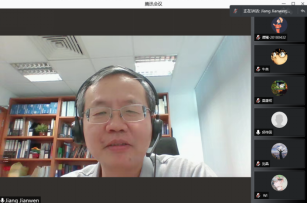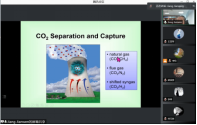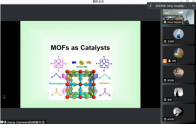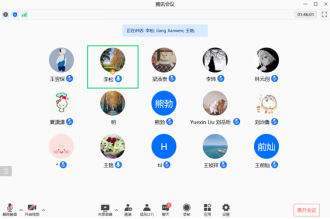On December 17th, HUST-NUS “Metal-Organic Frameworks for Chemical Separations and Reactions: A Computational Perspective” was held online. Invited by prof. Li Song, Associate Professor of EPE, Prof. Jiang Jianwen from the Department of Chemical and Biomolecular Engineering, National University of Singapore delivered a lecture entitled “Metal-Organic Frameworks for Chemical Separations and Reactions: A Computational Perspective”. The lecture was held by Prof. Li, with over 30 undergraduates and postgraduates attending the lecture online.

Prof. Jiang delivering a speech
Prof. Jiang introduced the recent computational studies of his group on MOFs for chemical separations and reactions, such as CO2 capture and utilization, hydrocarbon separation, water desalination, and solvent recovery. Computational studies, from Jiang’s perspective, reveal micro information from multiple aspects, illustrate experiment phenomena, and provide guidance for the design and synthesis of new materials.


Prof. Jiang making presentation centered on different application fields of MOFs
During Q & A session, attendees discussed the application prospect, cost, connection and difference between calculation and experiment of MOFs. When it comes to the prospect and cost, Prof. Jiang pointed out that because of their special structure and properties, MOFs become a research hotspot in gas storage, chemical separation, and catalytic activity. However, the problems of poor stability and high preparation cost remain to be solved to achieve industrial-scale applications. Prof. Li said that in the field of catalysis, MOFsstill have an advantage in cost compared to precious metals. With more explorations of preparation methods of materials, the cost is expected to reduce thanks to environmental-friendly synthetic methods.

The Q & A session
At the end of the lecture, Prof. Li expressed her gratitude to Prof. Jiang for delivering such a brilliant lecture. In the context of energy-saving and emission reduction, it is significant to discuss the research results of MOFs in the field of adsorption and separation. This lecture has promoted students’ understanding of MOFs with a positive impact on the development of EPE’s new energy and new material researches. It also has advanced the academic exchange between HUST and NUS, laying the foundation for closer cooperation between the two universities in the future.
Prof. Jiang Jianwen from the Department of Chemical and Biomolecular Engineering, National University of Singapore, is a Fellow of the Royal Society of Chemistry and serves as an editor of SCI journals likeAdvanced Theory and Simulations,Computational Materials Science, andScientific Reports. His research expertise is computational materials modeling, currently focused on nanoporous and membrane materials for energy, environmental and pharmaceutical applications (eg CO2 capture and utilization, water desalination, and drug delivery). He has published over 250 technical manuscripts, with over 13000 citations and H-index of 65 (based on Google Scholar).




